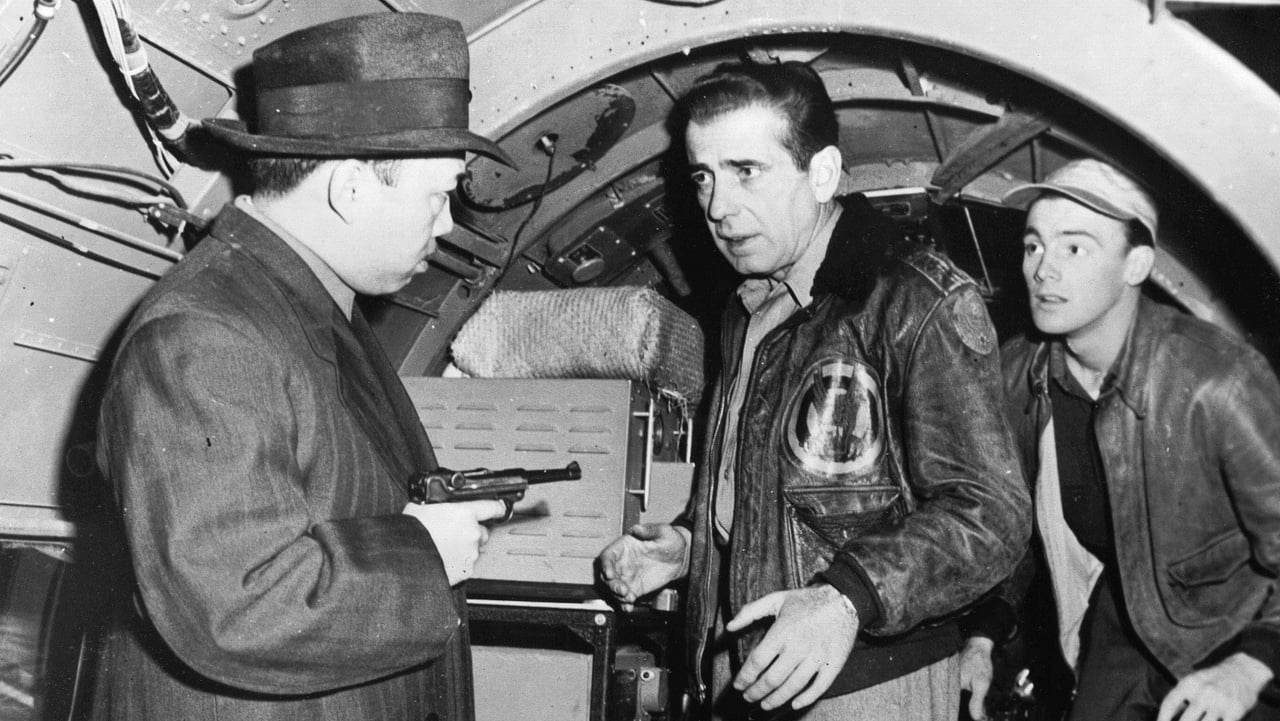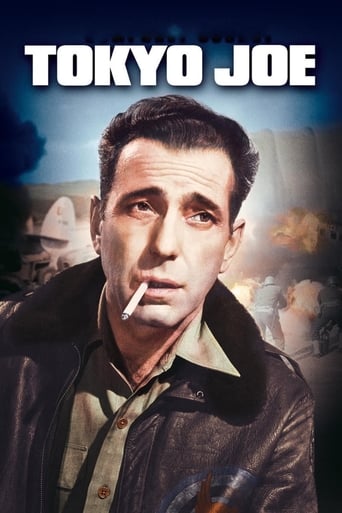



Fantastic!
Best movie of this year hands down!
I have absolutely never seen anything like this movie before. You have to see this movie.
View MoreThrough painfully honest and emotional moments, the movie becomes irresistibly relatable
View MoreA lesser film from Bogart to be sure and my rating is likely a little high because as a Bogart fan it's a treat to see a film from him I haven't seen before.Set in post-WWII Tokyo our protagonist Joe (Humphrey Bogart) is both a nightclub owner in Tokyo who left just before the attack on Pearl Harbor, but also a war hero who has just returned to see what has become of his club and his friend Ito who he left in charge. He is stunned to learn that the wife he left behind and who had been reported as dead is both alive and remarried with a young daughter. In order to extend his stay in Japan and try and convince his wife to return to him Joe becomes involved in a shady business venture with Baron Kimura (Sessue Hayakawa). This as a result puts Joe in the middle between the Japanese underworld and the American authorities.Although I enjoyed seeing Bogart on screen again it's neither a great part nor a particularly strong performance although he as usual has a powerful presence in his scenes and that's enough for me. The other performer of note is Sessue Hayakawa (Bridge on the River Kwai), who isn't really given a lot to do but does very effectively project his characters menace.The film's formula is somewhat derivative of other Bogart films and his roles in those films, the most obvious parallels can be found with Casablanca. To begin with both characters are night club owners in exotic locales, both present a cynical front but are heroic and both are separated from the woman they once loved.Although filmed at least partially in Japan we don't see a lot of the country, we are presented with some interesting Japanese culture which includes a few brief martial arts scenes as well as the Japanese language. This may not seem very usual today, but the film was made very shortly after the war.The co-operation of the American authorities likely contributed to their favorable portrayal. The portrayal of the Japanese is mixed.
View MoreHumphrey Bogart has been my favorite screen actor for over three decades now, so "Tokyo Joe"--one of the few Bogeys that I'd never seen--was a film that I anxiously put at the top of my list of DVDs to rent. Well, as I suspected, this is a decidedly lesser Bogey picture, but one that still offers much to even the casual viewer. In this one, Bogey portrays Joe Barrett, ex-owner of a nightclub on the Ginza. After WW2, he returns to Tokyo, and becomes involved in smuggling to save his ex-wife (who he thought had died) as well as his 6-year-old daughter (who he never knew existed). Bogey is well suited to this character, who at first looks after only himself but who soon sacrifices much for the sake of those near to him. The film features a compact, sensible story and is well acted by all. Czech actress Florence Marly, who plays Bogart's ex-wife, is quite attractive and acts impeccably; it's a shame she didn't appear in more American films. Sessue Hayakawa (unmustachioed, for a change) makes for a formidable villain, and it's fun to see Whit Bissell and Hugh "Ward Cleaver" Beaumont appear in scenes with the great Bogart. Teru Shimada (so memorable as Mr. Osato in my favorite Bond film, "You Only Live Twice") is fine as Bogart's partner, and little Lora Lee Michael and Bogey share some cute, sweet scenes together. And, like "As Time Goes By" did for "Casablanca" and "Too Marvelous For Words" did for "Dark Passage," here, "These Foolish Things" runs through the picture like a sweet, sad perfume. Thus, "Tokyo Joe," minor Bogey that it is, is still preferable to some other lesser Bogart films, such as "Battle Circus" and "Chain Lightning." And it is, needless to say, required viewing for all Bogey completists.
View MoreThis certainly was not one of Humphrey Bogart's best films? Why? There is very little action in it. When the action does occur, it is so quickly resolved. The end is predictable because after all, Florence Marly (Trina) can't have two husbands.What did the Baron really want to smuggle in? Just some Communists to stir things up, or was there even more to this?Alexander Knox is terribly miscast as Bob Landis, Tina's second husband. He is drab and needed to exert much more if he wanted his wife back all together. Surprising that after such a brilliant performance in 1944's "Wilson," Knox got stuck with this part. The part called for a much more suave type. Knox totally lacked appeal here and it's showing.The ending really ends with a question mark. However, we know how it had to end. This certainly wasn't a Casablanca. Ingrid Bergman could easily have taught Flo Marly some lessons here.
View More"Tokyo Joe" takes place in post WWII Tokyo, at a time when the city was still under marshal law and controlled by the American occupation forces.Joe Barrett (Humphrey Bogart), an ex pilot returns home to Tokyo. He goes to his now closed nightclub, "Tokyo Joe's" which he owned and operated with his partner Ito (Teru Shimada). Barrett learns from Ito that his wife Trina (Florence Marly) whom he believed to be dead, is alive and living nearby.Barrett rushes to meet her only to discover that she has divorced him and re-married businessman Mark Landis (Alexander Knox). Determined to win her back, Barrett looks for ways to extend his 60 day visitor's visa.Ito brings him to local Japanese "businessman", Baron Kimara (Sessue Hayakawa) who offers to finance a small freight airline which will carry food delicacies, such as frozen frogs into Japan for export abroad. When Barrett declines the offer, Shimara reveals that Trina had made propaganda broadcasts during the war for the Japanese. Trina explains that she had been coerced into making the broadcasts because the Japanese had taken her daughter from her. She tells Barrett that the seven year old Anya (Lora Lee Michael) is really his daughter.In order to be allowed to remain in the country, Barrett decides to accept Shimara's offer and hires two American crewmen, Danny (Jerome Courtland) and Idaho (Gordon Jones) to fly the airplane. Several shipments of frozen frogs later, Barrett suspects that Shimara is about to smuggle Japanese war criminals into the country. To ensure that Barrett carries out the mission, Shimara kidnaps Anya and..............................This was Bogart's second film made by his Santana production company for release by Columbia following the end of his Warner Bros. contract in 1948. Bogey gives his usual excellent performance although his ju-jitzu match (courtesy of stunt men) with Ito, is a little hard to imagine. Sessue Hayakawa had been around films since the early silents, but is probably best remembered for his role as the camp commandant in "The Bridge on the River Kwai" (1957). Alexander Knox who usually played sophisticated villains, is wasted here as Landis.Entertaining, but not among Bogie's best.
View More